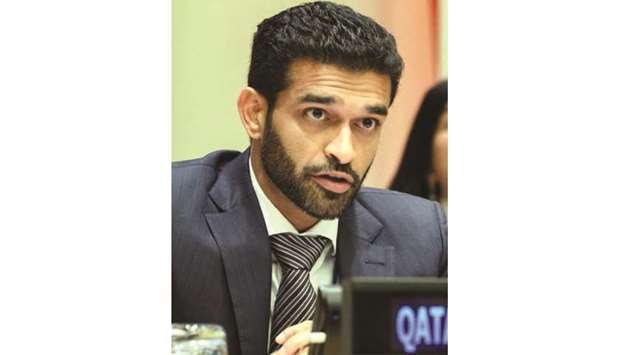The 2022 FIFA World Cup is seen as a catalyst for Qatar and the region to accelerate social progress and build a better future for generations to come, Supreme Committee for Delivery & Legacy (SC) Secretary-General Hassan al-Thawadi has said.
He made the observation while speaking during the official opening session of a United Nations Office on Drugs and Crime’s special event, titled ‘Crime Prevention and Sustainable Development Through Sports’, during which he discussed the transformative power of sport and Qatar’s vision for the first Middle Eastern FIFA World Cup.
Miroslav Lajcak, president of the United Nations General Assembly and former Slovakian foreign minister, opened the event at the United Nations (UN) headquarters in New York. The event brought together a wide array of figures, including member-state representatives at the ministerial and permanent representative level, distinguished athletes, sporting personalities, UN goodwill ambassadors, civil society, academia, the private sector, media and international organisations.
The date of the event was selected to coincide with the United Nations’ International Day of Sport for Development and Peace, which falls on April 6 every year, in commemoration of the inauguration of the first Olympic Games (1896) of the modern era.
Al-Thawadi spoke of the importance of a multilateral approach toward ensuring sport’s transformative power is properly utilised for the benefit of societies across the world and for the purpose of attaining the UN Sustainable Development Goals. He said, “Our collective challenge is to convey to the world sport’s power to transcend languages, faiths and culture and unite people. We must ensure that access to sport is facilitated and encouraged at all levels of society, whether as an educational tool in the developing world, or at the organisational level of a mega event such as the 2022 FIFA World Cup.”
The secretary-general, speaking in front of participants at the Ecosoc Chamber at the home of international diplomacy, explained to the audience Qatar’s integrated vision for a FIFA World Cup that “leaves a legacy of sustainable development for the host country, the region and the Arab world”, according to a report on sc.qa
“Hosting the first FIFA World Cup in the Middle East is an opportunity that we consider of the utmost importance for the benefit of our wider region and the Arab world as a whole,” he said. “We aren’t going to settle for hosting a month of football and then watch the world move on. We view the event as a catalyst for Qatar and the region to accelerate social progress and to build a better future for generations to come.”
Al-Thawadi detailed initiatives launched by the SC that specifically target youth, including Generation Amazing that focuses on contributing to the UN Sustainable Development Goals through projects that utilise the power of football to instigate social change, break down social barriers, increase access to sport and enhance community integration.
Qatar’s Permanent Representative to the United Nations, HE Sheikha Alya bint Ahmed bin Saif al-Thani, said: “Qatar’s commitment to improving society through sport is a key pillar in our international co-operation through the United Nations. Today’s event brought together leaders in the field of sport development and showcased the shared determination that exists to make a difference in society at all levels through sporting initiatives.”
In his remarks, Lajack said: “Sport can boost self-esteem, help communities, help bridge political, ethnic or religious differences, can be a driver for peaceful societies and make community initiatives more effective. Young people must be the torch-bearers for sustainable development, though. Young people should be leading the discussion regarding the important role sport can and does play around the world. What can the rest of us do? We can help by fully supporting sport as a rule for both development and peace to ensure we see its full potential.”
In a video message, ex-FC Barcelona legend, current Al Sadd player and SC global ambassador Xavi Hernandez urged participants to “develop strategies, which will give young generations new opportunities”. He added that “Qatar is utilising the FIFA World Cup to create social development,” recalling his experiences visiting refugee camps in Jordan, where he coached young boys and girls as part of the programme.
After the event’s conclusion, al-Thawadi attended the unveiling of the ‘Hey Ya (Let’s Go): Arab Women in Sport’ photography exhibition, which was opened by HE Sheikha Al Mayassa bint Hamad bin Khalifa al-Thani, Chairperson of Qatar Museums.
The exhibit, curated by Brigitte and Marian Lacombe, is located at the United Nations Delegates’ Entrance, visually showcasing how sport empowers Arab women and youths’ daily lives. The event was the latest in the SC’s outreach at the United Nations, with the continuing intention to communicate the purpose and detail behind the legacy programmes that serve as a foundation for the overall vision of hosting the 2022 FIFA World Cup, the report adds.

SC Secretary-General Hassan al-Thawadi.
